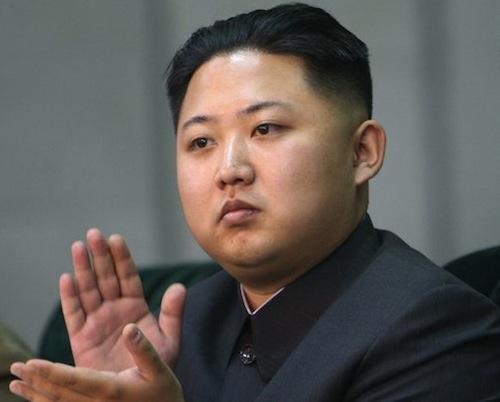On Friday, the Democratic People’s Republic of Korea ruined imperialist weekends by declaring war on South Korea and the United States, sort of. The official declaration is hard to interpret. On one hand, you’ve got sentences like “It is the resolute answer of the DPRK and its steadfast stand to counter the nuclear blackmail of the U.S. imperialists with merciless nuclear attack and their war of aggression with just all-out war.” It sounds like they’re standing in steadfast resolve to attack us mercilessly/nuclearly, right there, but then you also get sentences like this: “The state of neither peace nor war has ended on the Korean Peninsula.” So maybe Kim Jong Un is threatening nuclear peace. Also we’re pretty sure he does not have nuclear capabilities, and the whole baffling plate is slathered over in a runny translation that makes this state declaration sound like it was edited down to 500 words from 1000, then stretched out again to 750. In short, it’s a prime candidate for Close Reading.
Before you head down to the basement, you should understand the massive gap between North Korea’s rhetoric and what it is actually doing. The same day I read the DPRK’s promise to “never miss the golden chance to win a final victory in a great war for national reunification,” I also read of their plans to maybe close the Kaesong factory complex. Shut down a factory/annihilate your children with thermonuclear weapons is a broad spectrum of threats. Like any communication from Kim Jong Un and his government, this one is open to a range of interpretations.
Part of the problem facing the authors of this screed—I want it to be Kim Jong Un, but you know how hard the grandson of the supreme dictator worked in composition class—are its two conflicting theses. In summary, they are:
1) We are the supreme military and moral power of not just southeast Asia but the world, and we can destroy our enemies instantly, sweeping them away in a terrifyingly swift strike.
2) We’re gonna do it.
As with most threats, the problem here is that the act of threatening casts doubt on the threatener’s ability to make good. If the Korean peninsula is at war (q.v.: “from this moment, the north-south relations will be put at the state of war,”) and if thesis (1) is true (“this war will not be a three day-war but it will be a blitz war through which the KPA will occupy all areas of south Korea including Jeju Island at one strike,”) then why isn’t Ban Ki Moon wearing an olive jumpsuit right now?
When I man says “that’s it; I’m going to kick your ass” and does not hit you, you know he never will. The authors of North Korea’s declaration of war therefore enjoy a perverse kind of advantage. They know that the reader knows DPRK is not actually declaring war, because the People’s Army is not marching on Seoul. They also know that statements like this:
This sacred war of justice will be a nation-wide, all-people resistance involving all Koreans in the north and the south and overseas in which the traitors to the nation including heinous confrontation maniacs, warmongers and human scum will be mercilessly swept away.
…will not be taken literally. It’s a phony declaration of war from a fake superpower. Weirdly, where one obvious lie is a flaw, two obvious lies constitute rhetoric. Because there is no possibility that North Korea could make good on these particular threats in this particular way, the document becomes a sort of placeholder for a threat. “We are angry at you,” it says. “Change your behavior or we will disrupt Indo-Chinese shipping routes with golden flowing war horse.”
The beauty of such a surreal, prima facie impossible threat is that it invites the reader (entry-level analysts at the US State Department) to imagine what North Korea could do, if everyone there went even more nuts. Here lies Kim Jong Un’s great strength. We know that his country ranks somewhere between Libya and Chile on the list of world powers. We know that he grew up in a totalitarian propaganda state where his grandfather was a god and his father was a war hero despite being evidently incapable of opening an orange with his hands. Otherwise, we’re not even sure how old he is.
In the realms of diplomacy and military intelligence, disciplines based on knowing, we know weirdly little about Kim Jong Un and the nation he commands. In that context, North Korea’s declaration of war is the perfect combination of vaguely real and concretely insane. It is like being threatened by a man in a dream—a man you do not know in waking life, but whom you recognize from your dream about going back to high school, about eating dinner with Newton and your college girlfriend, about your own funeral. He is always there; he hates you—and who knows what the fudge he is?





I’m not sure this qualifies as a real Combat! Close Reading (they’re usually deliciously *close*) but I’d never actually looked at one of these pronouncements you hear so much about, and was glad to do so. It’s so completely insane that I’m baffled as to how these can be interpreted at all, or why they make the news, as they have so little relationship to reality, or even the reality inside the Dear Leader’s mind.
“Under the Loving Care of the Fatherly Leader: North Korea and the Kim Dynasty” by Bradley Martin is a mesmerizing read if you’re into Asian politics and even only vaguely interested in how North Korea got to be like it is today. It actually makes it possible to parse KCNA’s linguistic chowder as part of a long and questionably storied literary tradition. It also makes abundantly clear that seemingly insane jeremiads about global thermonuclear annihilation are just North Korean domestic politics as usual.